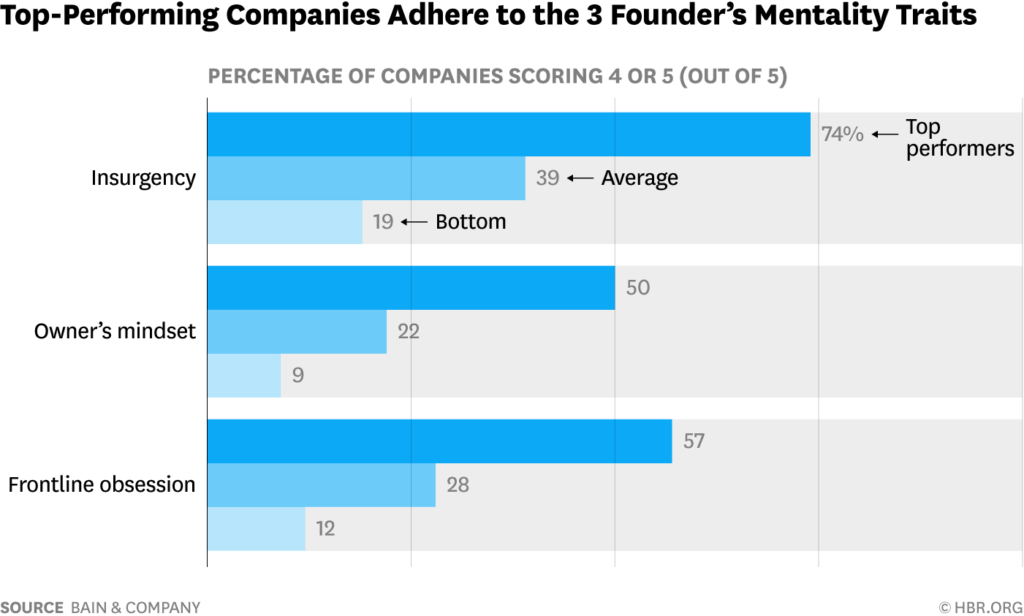In a start-up, innovating a new product, identifying a market opportunity, and establishing product-market fit is typically founder-led. Successful founders typically possess visionary thinking, resilience, and adaptability, but most importantly, the passion and commitment to realize their vision.
An investor evaluating a founder-led business is interested in whether the business has a foundation for achieving consistent growth over time. The investment becomes more attractive when the team demonstrates a founder’s mentality.
Most now agree that scaling to achieve consistent and sustained growth requires an organization with a culture based on a growth mindset. While crucial in a company’s early stages for driving growth and innovation, the concept of a founder’s mentality can present barriers to fostering a growth mindset as the business and organization become more complex. This article is a follow-up to our post “Unlocking the Power of High-Performing Teams.” It addresses how investors and new leaders in founder-led companies can benefit from a founder’s mentality while establishing the necessary (growth mindset) culture to achieve sustained growth.
What is a Founder’s Mentality?
Bain strategy consultants Chris Zook and James Allen reveal in their book ‘The Founder’s Mentality’ that success stems from a relentless drive to transform an idea into a thriving business. Characterized by ownership, action orientation, and sacrifice, a founder’s mentality is about believing deeply in your offering and persistently overcoming challenges. Successful companies, scaling profitably, maintain their core traits, positioning themselves as insurgents challenging industry norms or pioneering new sectors, all serving the underserved customer.
According to Zook and Allen, “Since 1990, we’ve found that the returns to shareholders in public companies where the founder is still involved are three times higher than in other companies. The most consistent high performers exhibit the attributes of the founder’s mentality four to five times more than the worst performers.”

According to a study by the Harvard Business Review, companies with a strong founder mentality tend to outperform their peers in terms of revenue growth, profitability, and productivity. The study found that these companies are more innovative, customer-focused, and nimble in their decision-making processes.
Growth creates complexity, and complexity is the silent killer of growth. All too often, companies lose the founder’s mentality as they become larger. Pursuing growth and scale adds organizational complexity, piles on processes and systems, dilutes the sense of insurgency, and challenges founders to sustain consistent growth.
What is a Growth Mindset?
As Stanford psychologist Carol Dweck proposed, a growth mindset is the belief that one’s abilities and intelligence can be developed through dedication, hard work, and a willingness to learn from mistakes. This mindset is characterized by a focus on continuous improvement, embracing challenges, and viewing setbacks as opportunities for growth.
In a business context, a growth mindset is essential for fostering a culture of innovation, adaptability, and resilience. Companies with a growth mindset are better equipped to navigate the challenges of a rapidly changing business landscape, as they are open to learning, experimenting, and pivoting when necessary.
This approach, emphasizing continuous learning and innovation, sets market leaders apart. “Our research shows that adaptability, driven by a growth mindset, is a key differentiator for market leaders,” according to Dweck.
Under CEO Satya Nadella, Microsoft has exemplified a corporate-wide growth mindset, shifting from internal competition to innovation and collaboration. Nadella’s philosophy, “Learn it all vs. know it all,” catalyzed Microsoft’s transformation, emphasizing learning from failure and customer feedback.
How Can a Founder Help Establish a Growth Culture?
An organization can adopt a growth mindset culture while maintaining its founder’s mentality, and the founders can play an important role. Founders that continue to exhibit some of these characteristics through the rise in organizational complexity can be an asset.
- Openness to Feedback: Founders who are open to feedback demonstrate that learning and adapting are vital. This openness shows that growth is always possible and encourages a culture where feedback is seen as a tool for improvement, not criticism.
- Resilience in the Face of Failure: Founders who view failures as learning opportunities set a powerful example for their teams. This resilience encourages a culture where experimentation is valued, and the fear of failure does not stifle innovation.
- Empowerment of Others: By delegating authority and trusting their teams to make decisions, founders foster a sense of ownership and accountability. This empowerment enables individuals at all levels to contribute ideas and solutions, which is vital for cultivating a growth mindset .
- Continuous Learning: Founders prioritizing learning for themselves and their teams demonstrate that development is ongoing. Investing in learning and development initiatives shows a commitment to growth at all levels of the organization.
- Humility: Founders who acknowledge that they don’t have all the answers and are willing to learn from others foster an environment of mutual respect and collaboration. This humility encourages everyone to contribute their ideas and expertise, driving collective growth .
CEOs who explicitly choose growth by setting an aspirational mindset and culture, activating pathways with the ten rules of growth, and executing with excellence offers six key strategies for leaders who aspire to reach the growth pinnacle of their industries and stay there.
McKinsey, Curagious Growth: Six Strategics for Continued Growth, 2023
Red Flags for Investors
While the founder’s mentality is crucial in the early stages of a company, certain founder characteristics can present barriers to fostering a growth mindset as the organization scales. Investors should closely evaluate whether the founders have created any of these characteristics in the culture;
- Centralization of Decision-Making: Founders who insist on making all key decisions themselves can stifle innovation and growth by not allowing their teams the autonomy to explore, learn, and make mistakes. This centralization can prevent the development of a culture where growth and learning are prioritized (Bain) (Knowledge at Wharton).
- Risk Aversion: Initially, founders’ willingness to take risks drives innovation and growth. However, as the company grows, an overly cautious approach to preserving the status quo can limit experimentation and the exploration of new opportunities, crucial components of a growth mindset (Bain) (Knowledge at Wharton).
- Resistance to Feedback: A strong attachment to their original vision may make some founders resistant to feedback, especially if it suggests significant changes. This resistance can create a culture where feedback is not valued, limiting opportunities for learning and improvement (Knowledge at Wharton).
- Perfectionism: While high standards can drive quality and innovation, an excessive focus on perfection can deter risk-taking and experimentation. This behavior can inhibit the development of a culture where mistakes are seen as learning opportunities (Knowledge at Wharton).
- Hero Syndrome: The belief that the founder is the only one capable of solving the company’s problems can demotivate employees and discourage them from taking the initiative. It can inhibit the development of a team-oriented approach to problem-solving and growth (Knowledge at Wharton).
- Over-Reliance on Past Successes: Founders who heavily rely on strategies or ideas that worked in the past may fail to adapt to changing market conditions or innovate sufficiently. This can prevent the company from evolving and growing in new directions (Knowledge at Wharton).
Identifying these potential roadblocks is critical to achieve scalable growth. Investors can evaluate the founder’s personality traits early and plan leadership and founder role changes as part of the investment thesis.
How Can a New Leader Deal with These Challenges?
When new leaders are brought in to help founder-led companies transition to a growth mindset, they must navigate the potential challenges the founder’s mentality poses. Here are some strategies they can employ:
- Establish Trust and Respect: New leaders should strive to build a strong relationship with the founder, acknowledging their contributions and demonstrating respect for their vision.
- Leverage the Founder’s Strengths: Identify and align the founder’s strengths with the company’s growth objectives, ensuring their expertise and passion are effectively leveraged.
- Encourage Delegation and Empowerment: Gradually introduce processes and structures that empower teams and promote a culture of accountability and autonomy.
- Embrace Continuous Learning: Foster an environment that encourages and celebrates experimentation, learning from failures, and continuous improvement.
Actionable Insights
To successfully mitigate any of the growth roadblocks set by a founder’s mentality, investors and new leaders in founder-led companies should consider the following steps:
- Conduct a thorough assessment of the founder’s attributes and their alignment with the company’s growth objectives. Identify potential barriers and develop strategies to mitigate them.
- Establish clear communication channels and create opportunities for the founder to share their vision and contribute their expertise while gradually transitioning decision-making authority to new leadership.
- Implement systems and processes that promote transparency, accountability, and continuous learning. Encourage cross-functional collaboration and knowledge sharing.
- Celebrate small wins and recognize individuals who embrace a growth mindset, fostering a culture of continuous improvement and adaptability.
- Seek external support and guidance from experienced advisors or mentors who have successfully navigated similar transitions in founder-led companies.
By acknowledging the potential challenges and leveraging the strengths of both the founder’s mentality and a growth mindset, investors and new leaders can effectively guide founder-led companies through transition periods, ultimately achieving sustainable growth and long-term success.
Resources
- Carol Dweck: Mindset: The New Psychology of Success – December 26, 2007
- Knowledge at Wharton Podcast: ‘The Founder’s Mentality’: Leveraging Startup Thinking for Long-term Growth, July 2016
- Business Insider: CASE STUDY: How Satya Nadella overhauled Microsoft’s cutthroat culture and turned it into a trillion-dollar ‘growth mindset’ company, March 2020
- Chris Zook and James Allen: The Founder’s Mentality: How to Overcome the Predictable Crises of Growth, Bain & Company, 2016





